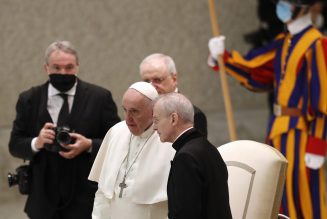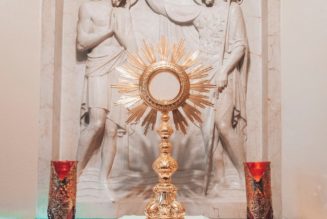Pillar subscribers can listen to this Pillar Post here: The Pillar TL;DR
Happy Friday friends,
And a very happy Easter to you all.
The octave is one of my favorite liturgical expressions of reality as the Church understands it.
As most of you know, I am somewhat obsessed with the idea of time — how we conceive of the idea, how we measure it, and how we relate to a God who came “in time,” exists “out of time” and is waiting for us at the end of time.
What we express in the Easter octave is the reality that the power of a single moment explodes the bounds of time so fully that a day cannot contain its feast.
For eight days, every day is Easter, encompassing not just the Sunday itself, but the rest of the week — marking the whole time of creation in the Genesis narrative and God’s day of rest from His labor — and then another day as He brings His plan for all of time to completion.
Of course, the day, or rather date, of Easter is itself a tricky prospect.
The Church celebrates it on, as St. Bede succinctly defined it, “the Sunday following the full Moon which falls on or after the equinox.” This doesn’t lend itself to intuitive calculation, to be sure — there is an insanely cool mechanical watch that can do it, but even it needs a manual adjustment every 40 years or so. And they only made four of them.
While the Church has insisted on calculating the date independent of the Jewish calendar since the Council of Nicea, the link to the lunar year is essential to the understanding of the event, I would contend, since it simply isn’t possible to unpack the significance of the Paschal narrative without rooting it in the celebration of Passover.
Easter isn’t a “date.” It is living history, linked in and out of time to God’s plan of salvation for all mankind and His relationship with His people. We don’t mark the occasion like an anniversary, we live it fully and actively — or at least we should.
Of course, it would be better if we all, as Christians, could live it together, but we don’t, since the Orthodox Churches (and until recently the Ukrainian Greek Catholic Church) hold to a version of the Julian calendar, named for the pagan Roman emperor who brought it in, and which — while a noble effort at time keeping — would slip by some 11 minutes a year.
That might not seem like a lot, but it adds up over the centuries, to the point that things were two weeks out of whack (with serious seasonal repercussions) when Pope Gregory introduced his reformed, improved, and eponymous calendar in the West 1500 years later.
Ecumenical Patriarch Bartholomew of Constantiople this week called it a “scandal” that all Christians can’t celebrate Easter together at the same time, and indeed it is. The good news is that the Catholic Church and much of the Orthodox communion (led by the ecumenical patriarch) seem pretty committed to making this happen, eventually.
Of course, all this tends to be lost on the wider world, which is why in secularized countries which still use the Christian calendar to dole out public holidays, you see perennial calls for affixing Easter to a specific calendar date.
This debate happens annually in the UK. When I worked for a Member of Parliament, there would be an annual spring flood of letters from vexed constituents — usually well-to-do parents complaining that the kids’ annual holiday kept moving, making it hard to plan a ski vacation — and thus demanding the government just pick a weekend.
As it happens, the Anglican Archbishop of Canterbury, Justin Welby, has lent his support and sympathy to these complaints in the past. He said in 2016 that, while he wanted to see a stable calendar date picked before he retired, it would need a lead time to bring in, because “most people have probably printed the calendars for the next five years and school holidays and so on are already fixed.”
That might strike me as a somewhat discordant ambition, set against Catholic and Orthodox mutual aspirations for liturgical commonality. But what is the Church of England for, after all, if it isn’t for the annual family jaunt to Val-d’Isère?
Anyway, here’s the news.
The News
A civil court in France has ruled that Cardinal Marc Ouellet, former prefect of the Dicastery for Bishops, and the Dominicans of the Holy Spirit dismissed a religious sister from her community without just cause.
The sister said she was given no reason for her removal, which she argues was an assault on her reputation and privacy, and caused her “material and moral damage,” and the French court awarded her 200,000 euros in damages.
What, exactly is a French civil court doing wading into a matter in internal Church governance conducted by a Vatican cardinal on papal assignment? Good question. Perhaps this is what they mean by laïcité?
You can read the whole story here.
—
The ecumenical affairs committee of the U.S. bishops’ conference has recommended that seminaries, dioceses, and individuals take up for study a document emphasizing the shared baptismal identity of Catholics and Evangelicals.
The bishops’ ecumenism committee decided in mid-March to recommend the document and encourage further study of it.
“Although not a document of the committee nor a product of a dialogue sponsored by the USCCB,” Bambera wrote in a letter, he recommended it be used “along with the accompanying commentaries, be used in prayer and study, preferably within groups of Catholics and Evangelicals together.”
—
Religious leaders in the U.S. have long raised concerns about the rise of the “nones” – people who profess to adhere to no faith tradition.
Among American adults under 30, “none” significantly outranks Protestants and Catholics as a religious affiliation.
Actually, Brendan did one of his customary deep dives and exploded quite a few casual “truths” thrown around about religious demographics in the U.S., including by age, generational cohort, and even looking at how immigration is (not) offsetting the trends — this one is a must read.
—
A Catholic graduate school says the proposed Missouri location of its future campus is not in danger of contamination from nearby nuclear waste.
The Augustine Institute is in the process of buying a new 284-acre campus in Florissant, Missouri, where it expects to move this summer. But the community has found itself at the center of a political and ecological storm, after nuclear contamination was found in local houses’ backyards earlier this year.
The homes sit along Coldwater Creek, a waterway contaminated by uranium waste, which is two miles from the Boeing Leadership Center, the campus expected to be purchased by the AI, and which has shut a local elementary school indefinitely.
But the AI’s president told The Pillar that all the necessary due diligence has been done and that basically there’s nothing to worry about, whatever is going on two miles down the road.
You can read all about it here.
—
Pope Francis this week took to discussing the politics of conclaves past, his road to the papacy, and the machinations of a group of cardinals who wanted to use his candidacy as a blocking move during the voting in 2005.
But you can read about that anywhere.
I also gamed out how the voting rounds in a conclave would have to go to give a “compromise candidate” a chance at coming out on top. But as I did so, I concluded that even in that eventuality Parolin had only about a 50% chance of being elected. Just as likely, I think, he’d end up being a stalking horse for a real surprise candidate.
You can read the whole analysis here.
Thanks to the generosity of the Knights of Columbus, St. Bernard’s School of Theology and Ministry invites anyone anywhere to audit one summer course entirely free. Learn more about topics such as Catholic authors, J.R.R. Tolkien and George MacDonald; prayer and discernment; artificial intelligence; Pope St. John Paul II’s “Gospel of Life;” and more!
The papal parlor game
Since publishing that Parolin analysis the other day, I have heard from a few people suggesting that the whole genre of pre-conclave analysis is a wasted effort and a little silly, since there’s no reason to assume Pope Francis won’t happily reign for another three or even five years, at which point any contemporary calculus will be totally moot.
I agree, up to a point. I don’t have any suspicion the pope is in anything less than the best possible condition for a man of his age and health.
And I certainly don’t think for a second he’s planning to resign, or will ever seriously entertain the notion — any feints in that direction he makes, I’ve long believed, are Francis’ playful way of messing with the media.
So, all that said, yes it could be years before a conclave. And yes, any handicapping of the candidates now would be woefully out of date by then. But I don’t think it follows that it’s therefore irrelevant.
The truth is, Pope Francis is himself spending a lot of time looking back lately — that’s what I consider book length interviews and authorized biographies to be — and the curia and college of cardinals is spending more and more time talking about what’s over the horizon. That matters, even if it’s all premature. It is the conversational reality of the top tier of the Church’s governance right now.
And who is being discussed, and why, and pitted versus whom in a hypothetical conclave running all matters, too. It says something about the mood of different parts of the hierarchy, the trends of thought, and what people are pegging as the real priorities of the moment — even if it comes to nothing in the immediate term.
Sure, some of the names floating up are clearly “having a moment,” like Cardinal Pierbatista Pizzaballa, who is getting a lot of attention primarily because of his voice amid the war in Gaza. But if his star doesn’t dim in the next few months or so, people are going to start asking serious questions about his all-round suitability and experience. That’s a good thing.
Conversely, as with Cardinal Parolin, some potential candidates can loom so large in the daily consciousness and chatter that they become the beneficiaries (or opposite) of a bunch of general assumptions about their qualities, and they actually go unassessed in a serious way, until after the fact.
All this by way of saying, is vetting and ranking the papabile a bit of a Vatican parlor game? Sure. But it’s also part of the normal lived reality of Roman life when the pope is of a certain age.
It’s not necessarily ghoulish, and it certainly isn’t a wasted effort.
The art of the meal
I never get invited to dinner parties anymore, it seems. And I miss them.
By this, I don’t mean we (my wife and I) never have dinner out, or at someone else’s table; we’re often hosted en famille in the homes of friends and family, and we certainly enjoy it. But the dinner party, properly understood, is something else, and it seems to be dying out.
This is possibly just because I’m getting older and, now with a toddler, my social circle is hardening — even shrinking, if that’s possible.
Another reason, I suspect, is a lingering after effect of the pandemic, when assembling groups of strangers (not perfect strangers, but everybody should be meeting somebody new) in your house was banned by force of law for a while, and subject to social censure for a while longer.
It’s probably also because, I think, it takes a certain kind of personality to conduct a good dinner party, and you have to be the kind of person who wants to do it to make it happen. Those people are rare.
For purposes of clarity, a proper dinner party has some basic constituent parts which I’ll outline:
1. The guest list should be deliberate, varied, and the guests shouldn’t all know each other.
Everyone should know the host, obviously, and it’s fine (even helpful) for everyone to have something in common (Catholicism, for example). But the ambition of a good dinner party should be to introduce people to each other — new people are an adventure, or at least potentially good entertainment — and the challenge is selecting guests with an eye to who will mix well with whom.
2. You dress up. I’m not saying black tie, or even ties of any kind, necessarily. But the atmosphere should be somewhat elevated by common consent and effort. It adds to the occasion and affects how everyone behaves.
3. There should be drinks before dinner. Real drinks, for a good hour. This allows for meal planning around inevitably staggered arrivals, and for everyone to meet everyone.
I’m not saying the host mugs you at the door with a martini shaker and people get sloppy, but two drinks before dinner aids conversation and means people go easier on the wine at table.
4. Seating matters, especially if there are more than three couples (including hosts). Spouses shouldn’t be seated next to each other — ever — they talk all the time already, and comparing notes on the way home about who was fascinating and who was awful is part of the fun.
5. You don’t make people play a game, or listen to a poetry reading/song recital, or “come as your favorite hobbit” or Lord knows what else. If you want to have a game night, have one, they’re lovely. But a dinner party is about spontaneous conversation among new and hopefully interesting company.
Reading this back it comes across as a lot of rules, I realize. That’s not my intention. I’m just trying to describe a thing that used to be fairly common and now seemingly isn’t.
I don’t mean this to sound intimidating, either, though hosting a dinner party is undeniably a skill. Managing a full dinner service while midwifing new acquaintances is like conducting an orchestra. It can be done well or badly. And it can be done well in different ways.
Some great hosts seem barely there at times, consumed with the cooking and service — a great fictional example of this, and of a great dinner party, is the film Big Night, probably my favorite movie.
Others hosts make a true spectacle of themselves and hogg the attention like Lenny Berstein (who, ironically, threw famously terrible parties) yet still produce symphonic results.
The best hosts are somewhere in between, guiding the tone of the evening without bossing the conversation.
The great magic trick of a well composed party is to leave every guest feeling like they are somehow simultaneously the most and least interesting person at the table, so treasured is their presence and so fascinating is the company.
A couple I know in Rome are absolute past masters of the art of the dinner, and I shamelessly fish for invites whenever I am going to be in town.
I am, I should be clear, a terrible dinner party host myself. It’s why I don’t have them. I throw a decent enough drinks party, which is a different beast altogether, but I lack the social silkiness needed to set everyone else at ease. It’s why I love being invited to dinner parties, and why I miss them.
Being terrible at first introductions and worse at small talk, I welcome the structure of a good evening out under the gentle guidance of a gracious host and I miss the invitations that used to come, if not frequently, then often enough they didn’t feel like an eclipse.
The problem is probably with me. Being a good guest is as important as being a good host, and if you aren’t a natural conversationalist you need to be an interesting enough specimen to make up for it.
Come to think of it, the dinner party invites dried up around the time we set up The Pillar, perhaps because that was when I shed a lot of the “other things” I used to do — canonical practice, TV spots, column writing for other places and so on — which might have lent me a whiff of false erudition or D-list glamour.
This gig does soak up any and all modestly original or creative impulses I might otherwise have had, I suppose. But I never have to do television again, so the trade is worth it, all things considered.
I do miss the parties, though.
See you next week,
Ed. Condon
Editor
The Pillar
Thanks to the generosity of the Knights of Columbus, St. Bernard’s School of Theology and Ministry invites anyone anywhere to audit one summer course entirely free. Learn more about topics such as Catholic authors, J.R.R. Tolkien and George MacDonald; prayer and discernment; artificial intelligence; Pope St. John Paul II’s “Gospel of Life;” and more!
Comments 12
Services Marketplace – Listings, Bookings & Reviews
















